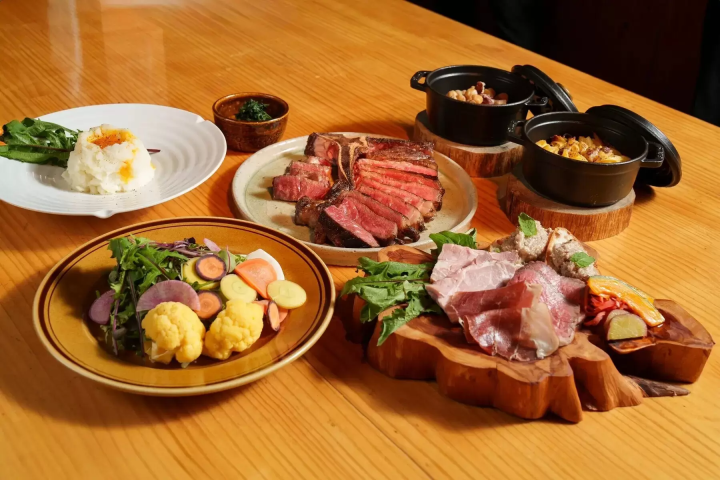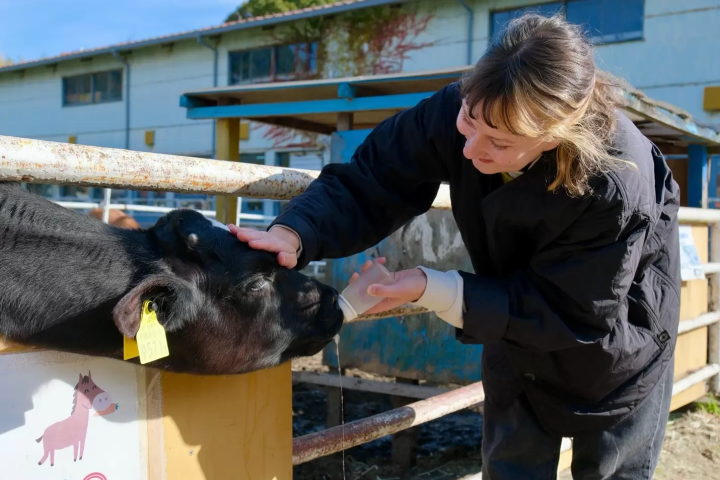[Michinoku Coastal Trail ] I participated in the "Double Cliff Challenge Tour" in Tanohata Village , Iwate Prefecture
![[Michinoku Coastal Trail ] I participated in the "Double Cliff Challenge Tour" in Tanohata Village , Iwate Prefecture](https://resources.matcha-jp.com/resize/720x2000/2025/03/30-229697.webp)
Hello. I'm K, in charge of the Miyako region. This is a report on our participation in the " Michinoku Coastal Trail Full Opening 5th Anniversary & Noto Peninsula Earthquake Recovery Support Charity Event" held in Tanohata Village last July. We'll be bringing you a report on the two-day tour!
![[Michinoku Coastal Trail ] I participated in the "Double Cliff Challenge Tour" in Tanohata Village , Iwate Prefecture](https://resources.matcha-jp.com/resize/720x2000/2025/03/31-229826.webp)
5th Anniversary of the Michinoku Coastal Trail Trail Opening & Charity Event to Support the Noto Peninsula Earthquake Recovery Tour Report: Conquering both "Kitayamazaki" and "Uonosu Cliff"
-
Table of Contents
- What is the Michinoku Coastal Trail?
- Day 1: Tsukuehama Banya Group → Hand-Dug Tunnel → Kitayamazaki to Kurosakiso (13km)
- DAY 2 Shimakoshi Station → Shiraike Beach → Uonosu Cliff Observatory (5km)
What is the Michinoku Coastal Trail?
The Michinoku Coastal Trail is a long trail that connects the Pacific coastline from Aomori Prefecture Hachinohe City to Soma City, Fukushima Prefecture . Its greatest attraction is the Toyotomi of spots where you can experience the dynamic ocean scenery. There are many sights to see, such as beautiful cliffs and the unique scenery of the ria coast. You can experience the culture of fishing villages, interact with the people, enjoy the overwhelming beauty of nature, and experience unforgettable impressions while feeling the sea breeze.
The goal of this tour was when Noriyoshi Kato, a leading authority on long trails in Japan and an author, saw the view from Unosu Cliff and proposed the idea of a long trail along the Sanriku coast to the Ministry of the Environment. This led to the launch of the Tohoku Pacific Long-distance Nature Trail (Michinoku Coastal Trail) Project as a major post-reconstruction project.
For more information, please visit the Michinoku Trail Club website.
Day 1: Tsukuehama Banya Group → Hand-Dug Tunnel → Kitayamazaki to Kurosakiso (13km)
This course will cover about 20km of the 1000km-long trail route between Tanohata Village and Fudai Village over two days. Please take a look at the report, which is full of photos.
On the first day, we started by gathering at the Tsukuehama guardhouses, which had been restored to their original state after the earthquake. The participants gradually became silent as they suddenly started climbing a steep Saka. However, once they had made it to the Saka, a magnificent view of the blue sky, ocean, and rugged cliffs awaited them!
![[Michinoku Coastal Trail ] I participated in the "Double Cliff Challenge Tour" in Tanohata Village , Iwate Prefecture](https://resources.matcha-jp.com/resize/720x2000/2025/03/31-229789.webp)
After climbing the Saka slope and continuing on, you will then descend to the sandy beach.
![[Michinoku Coastal Trail ] I participated in the "Double Cliff Challenge Tour" in Tanohata Village , Iwate Prefecture](https://resources.matcha-jp.com/resize/720x2000/2025/03/31-229790.webp)
The sandy beach comes into view.
![[Michinoku Coastal Trail ] I participated in the "Double Cliff Challenge Tour" in Tanohata Village , Iwate Prefecture](https://resources.matcha-jp.com/resize/720x2000/2025/03/31-229792.webp)
![[Michinoku Coastal Trail ] I participated in the "Double Cliff Challenge Tour" in Tanohata Village , Iwate Prefecture](https://resources.matcha-jp.com/resize/720x2000/2025/03/31-229793.webp)
Beautiful lilies were in bloom.
![[Michinoku Coastal Trail ] I participated in the "Double Cliff Challenge Tour" in Tanohata Village , Iwate Prefecture](https://resources.matcha-jp.com/resize/720x2000/2025/03/31-229794.webp)
After this, we walked along the coastline for a while. I thought it was a dead end, but there it was...
![[Michinoku Coastal Trail ] I participated in the "Double Cliff Challenge Tour" in Tanohata Village , Iwate Prefecture](https://resources.matcha-jp.com/resize/720x2000/2025/03/31-229796.webp)
We came across a hand-dug tunnel that penetrated the cliff rocks! We put on our headlamps and continued on.
![[Michinoku Coastal Trail ] I participated in the "Double Cliff Challenge Tour" in Tanohata Village , Iwate Prefecture](https://resources.matcha-jp.com/resize/720x2000/2025/03/31-229797.webp)
![[Michinoku Coastal Trail ] I participated in the "Double Cliff Challenge Tour" in Tanohata Village , Iwate Prefecture](https://resources.matcha-jp.com/resize/720x2000/2025/03/31-229798.webp)
There is a signpost for the Michinoku Coastal Trail.
![[Michinoku Coastal Trail ] I participated in the "Double Cliff Challenge Tour" in Tanohata Village , Iwate Prefecture](https://resources.matcha-jp.com/resize/720x2000/2025/03/31-229802.webp)
Once you pass through the hand-dug tunnel, you'll come to a quiet cove where no man-made structures are visible.
![[Michinoku Coastal Trail ] I participated in the "Double Cliff Challenge Tour" in Tanohata Village , Iwate Prefecture](https://resources.matcha-jp.com/resize/720x2000/2025/03/31-229803.webp)
We head towards the second hand-dug tunnel. It feels like a dinosaur might appear.
![[Michinoku Coastal Trail ] I participated in the "Double Cliff Challenge Tour" in Tanohata Village , Iwate Prefecture](https://resources.matcha-jp.com/resize/720x2000/2025/03/31-229805.webp)
The second hand-dug tunnel is a little wider, with a bat hanging from it.
![[Michinoku Coastal Trail ] I participated in the "Double Cliff Challenge Tour" in Tanohata Village , Iwate Prefecture](https://resources.matcha-jp.com/resize/720x2000/2025/03/31-229807.webp)
Once you exit the tunnel, you'll be faced with climbing a ladder.
![[Michinoku Coastal Trail ] I participated in the "Double Cliff Challenge Tour" in Tanohata Village , Iwate Prefecture](https://resources.matcha-jp.com/resize/720x2000/2025/03/31-229808.webp)
Once you reach the top of the ladder, you'll find a wide sandy beach. The Pacific Ocean stretches out endlessly, creating a magnificent view.
![[Michinoku Coastal Trail ] I participated in the "Double Cliff Challenge Tour" in Tanohata Village , Iwate Prefecture](https://resources.matcha-jp.com/resize/720x2000/2025/03/31-229809.webp)
After the seaside course ends, you head back into the mountains, slowly climbing up the stairs one step at a time.
![[Michinoku Coastal Trail ] I participated in the "Double Cliff Challenge Tour" in Tanohata Village , Iwate Prefecture](https://resources.matcha-jp.com/resize/720x2000/2025/03/31-229811.webp)
The stairs got steeper and steeper, and I kept going up and down. My knees started to shake.
![[Michinoku Coastal Trail ] I participated in the "Double Cliff Challenge Tour" in Tanohata Village , Iwate Prefecture](https://resources.matcha-jp.com/resize/720x2000/2025/03/31-229812.webp)
We climb up and down the steep stairs... and slowly make our way along, admiring the green trees.
![[Michinoku Coastal Trail ] I participated in the "Double Cliff Challenge Tour" in Tanohata Village , Iwate Prefecture](https://resources.matcha-jp.com/resize/720x2000/2025/03/31-229813.webp)
The most difficult part is the steep stairs! Be careful not to slip!
![[Michinoku Coastal Trail ] I participated in the "Double Cliff Challenge Tour" in Tanohata Village , Iwate Prefecture](https://resources.matcha-jp.com/resize/720x2000/2025/03/31-229814.webp)
Once you finish the stairs, the view of the ocean and the strangely shaped rocks will spread out before you again. Let's take a short break.
![[Michinoku Coastal Trail ] I participated in the "Double Cliff Challenge Tour" in Tanohata Village , Iwate Prefecture](https://resources.matcha-jp.com/resize/720x2000/2025/03/31-229815.webp)
![[Michinoku Coastal Trail ] I participated in the "Double Cliff Challenge Tour" in Tanohata Village , Iwate Prefecture](https://resources.matcha-jp.com/resize/720x2000/2025/03/31-229816.webp)
The last staircase!! All the participants looked at each other and asked, "Are there more?"
![[Michinoku Coastal Trail ] I participated in the "Double Cliff Challenge Tour" in Tanohata Village , Iwate Prefecture](https://resources.matcha-jp.com/resize/720x2000/2025/03/31-229817.webp)
Once you reach the top, you will be greeted by the soothing blue of the sea and sky. The view from Kitayamazaki Observatory is a scenic spot that was given the highest rank of Special A in the national tourism resource evaluation "Natural Resources Coasts and Misaki".
![[Michinoku Coastal Trail ] I participated in the "Double Cliff Challenge Tour" in Tanohata Village , Iwate Prefecture](https://resources.matcha-jp.com/resize/720x2000/2025/03/31-229818.webp)
Leaving the seaside behind, we now head into the mountains. We walk along a small river. The sound of the flowing water feels refreshing.
![[Michinoku Coastal Trail ] I participated in the "Double Cliff Challenge Tour" in Tanohata Village , Iwate Prefecture](https://resources.matcha-jp.com/resize/720x2000/2025/03/31-229819.webp)
![[Michinoku Coastal Trail ] I participated in the "Double Cliff Challenge Tour" in Tanohata Village , Iwate Prefecture](https://resources.matcha-jp.com/resize/720x2000/2025/03/31-229820.webp)
![[Michinoku Coastal Trail ] I participated in the "Double Cliff Challenge Tour" in Tanohata Village , Iwate Prefecture](https://resources.matcha-jp.com/resize/720x2000/2025/03/31-229821.webp)
The sea is visible in the distance. The finish line is just around the corner.
![[Michinoku Coastal Trail ] I participated in the "Double Cliff Challenge Tour" in Tanohata Village , Iwate Prefecture](https://resources.matcha-jp.com/resize/720x2000/2025/03/31-229822.webp)
As we walked through the mountains, we suddenly came across a large tree root in front of us! It seemed to be a fallen tree, so we went around it and continued on. As we reached the top of the Saka, we could see our lodging, Kurosaki-so, which was also our goal for the day.
![[Michinoku Coastal Trail ] I participated in the "Double Cliff Challenge Tour" in Tanohata Village , Iwate Prefecture](https://resources.matcha-jp.com/resize/720x2000/2025/03/31-229823.webp)
Thank you for your hard work at the barbecue! We took a bath to wash off the sweat and then toasted together! We talked about the hardships of the day and recharged our energy with cold beer and delicious seafood barbecue. I thought I should go to bed early to prepare for tomorrow, but the delicious beer just wouldn't stop...
DAY 2 Shimakoshi Station → Shiraike Beach → Uonosu Cliff Observatory (5km)
On the second day, the weather was cloudy despite the forecast of rain. My legs were still tired from yesterday, but today's course was only 5km long. The highlight was crossing five tunnels. I'll do my best.
Today's course is not the main route of the Michinoku Coastal Trail, as it can only be walked at low tide and when the waves are low due to land subsidence caused by the Great East Japan Earthquake. This time, we will walk the "phantom course" at low tide during spring tide.
![[Michinoku Coastal Trail ] I participated in the "Double Cliff Challenge Tour" in Tanohata Village , Iwate Prefecture](https://resources.matcha-jp.com/resize/720x2000/2025/03/31-229824.webp)
The tide is quite low today. It looks like it will be easy to walk along the shore.
![[Michinoku Coastal Trail ] I participated in the "Double Cliff Challenge Tour" in Tanohata Village , Iwate Prefecture](https://resources.matcha-jp.com/resize/720x2000/2025/03/31-229825.webp)
![[Michinoku Coastal Trail ] I participated in the "Double Cliff Challenge Tour" in Tanohata Village , Iwate Prefecture](https://resources.matcha-jp.com/resize/720x2000/2025/03/31-229827.webp)
Some beaches are made of pebbles, others are made of large rocks. Gradually the sun came out and the weather started to improve.
![[Michinoku Coastal Trail ] I participated in the "Double Cliff Challenge Tour" in Tanohata Village , Iwate Prefecture](https://resources.matcha-jp.com/resize/720x2000/2025/03/31-229828.webp)
![[Michinoku Coastal Trail ] I participated in the "Double Cliff Challenge Tour" in Tanohata Village , Iwate Prefecture](https://resources.matcha-jp.com/resize/720x2000/2025/03/31-229829.webp)
The journey will take you directly below impressive cliffs that are 100 metres high.
![[Michinoku Coastal Trail ] I participated in the "Double Cliff Challenge Tour" in Tanohata Village , Iwate Prefecture](https://resources.matcha-jp.com/resize/720x2000/2025/03/31-229831.webp)
The first tunnel came into view. This time it was a series of five short hand-dug tunnels.
![[Michinoku Coastal Trail ] I participated in the "Double Cliff Challenge Tour" in Tanohata Village , Iwate Prefecture](https://resources.matcha-jp.com/resize/720x2000/2025/03/31-229832.webp)
![[Michinoku Coastal Trail ] I participated in the "Double Cliff Challenge Tour" in Tanohata Village , Iwate Prefecture](https://resources.matcha-jp.com/resize/720x2000/2025/03/31-229833.webp)
Since it is a phantom course, I continue walking with excitement.
![[Michinoku Coastal Trail ] I participated in the "Double Cliff Challenge Tour" in Tanohata Village , Iwate Prefecture](https://resources.matcha-jp.com/resize/720x2000/2025/03/31-229834.webp)
![[Michinoku Coastal Trail ] I participated in the "Double Cliff Challenge Tour" in Tanohata Village , Iwate Prefecture](https://resources.matcha-jp.com/resize/720x2000/2025/03/31-229835.webp)
We proceed along the gentle coastline.
![[Michinoku Coastal Trail ] I participated in the "Double Cliff Challenge Tour" in Tanohata Village , Iwate Prefecture](https://resources.matcha-jp.com/resize/720x2000/2025/03/31-229836.webp)
The next tunnel comes into view in the distance.
![[Michinoku Coastal Trail ] I participated in the "Double Cliff Challenge Tour" in Tanohata Village , Iwate Prefecture](https://resources.matcha-jp.com/resize/720x2000/2025/03/31-229838.webp)
![[Michinoku Coastal Trail ] I participated in the "Double Cliff Challenge Tour" in Tanohata Village , Iwate Prefecture](https://resources.matcha-jp.com/resize/720x2000/2025/03/31-229839.webp)
We have arrived at Mihikiba Tunnel.
![[Michinoku Coastal Trail ] I participated in the "Double Cliff Challenge Tour" in Tanohata Village , Iwate Prefecture](https://resources.matcha-jp.com/resize/720x2000/2025/03/31-229840.webp)
![[Michinoku Coastal Trail ] I participated in the "Double Cliff Challenge Tour" in Tanohata Village , Iwate Prefecture](https://resources.matcha-jp.com/resize/720x2000/2025/03/31-229841.webp)
![[Michinoku Coastal Trail ] I participated in the "Double Cliff Challenge Tour" in Tanohata Village , Iwate Prefecture](https://resources.matcha-jp.com/resize/720x2000/2025/03/31-229842.webp)
The view from between the rocks is fascinating.
![[Michinoku Coastal Trail ] I participated in the "Double Cliff Challenge Tour" in Tanohata Village , Iwate Prefecture](https://resources.matcha-jp.com/resize/720x2000/2025/03/31-229843.webp)
We passed through all the tunnels and arrived at Makisawa Beach.
![[Michinoku Coastal Trail ] I participated in the "Double Cliff Challenge Tour" in Tanohata Village , Iwate Prefecture](https://resources.matcha-jp.com/resize/720x2000/2025/03/31-229844.webp)
The weather got better and we could see the blue sky.
![[Michinoku Coastal Trail ] I participated in the "Double Cliff Challenge Tour" in Tanohata Village , Iwate Prefecture](https://resources.matcha-jp.com/resize/720x2000/2025/03/31-229845.webp)
Just as I was feeling a sense of accomplishment after walking along the nature trail by the water's edge, a course awaited me, with a 150m high Saka to climb at once. I was so tired that I only managed to take one photo of this tree on the final mountain path.
After climbing 150 meters, we reached the finish line at the Uonosu Cliff Observatory. It was a fulfilling two days! We safely completed the Michinoku Coastal Trail tour, which conquered the double cliffs of Kitayamazaki Cliff and Uonosu Cliff. I wasn't confident that I could walk the entire Kitayamazaki area alone, where there are many stairs, so I'm really glad that I took this tour and was able to walk with the guide and other participants.
For more information about the route we walked this time, please click the link below. You can also get more detailed information by contacting the Tanohata Network Experience Village.
Why not visit Tanohata Village in Iwate Prefecture and experience an adventurous journey by walking the Michinoku Coastal Trail ?
Hello! This is the Iwate Prefectural Coastal Regional Development Bureau, which is responsible for the coastal areas of the Iwate Prefectural Government. We are responsible for 13 coastal municipalities from Tanohata Village in the north to Rikuzentakata City in the south. On March 11, 2011, a massive tsunami caused by the Great East Japan Earthquake struck this area. Although we suffered enormous damage, we have been on the road to recovery thanks to support from all over the world. The area also places great emphasis on disaster prevention education, and has earthquake relics and facilities to pass on the history of the disaster. You can experience the history of reconstruction by walking with a guide. [Famous places in the north] Tanohata Village is home to Kitayamazaki, a series of 200-meter-high cliffs; Iwaizumi Town is home to Ryusendo Cave, one of Japan's three largest limestone caves; Miyako City is home to Jodogahama, a beach of pure white stones said to resemble paradise; and Yamada Town is home to Oshima (also known as Holland Island) and Koshima, both of which float in a calm bay. The Sanriku Railway is the perfect way to enjoy this region. Take a leisurely ride on the local line and enjoy the scenery from the train window. [Famous places in the middle] In Otsuchi town, you can enjoy both the sea and the mountains, such as Horai Island, affectionately known to the locals as "Hyotan Island," and in Kamaishi city, the Hashino Iron Mine, the site of Japan's oldest surviving Western-style blast furnace and a registered World Heritage Site. This area is also famous for its local performing arts such as Toramai and ShikaOdori, and you can experience these ancient traditions at events and festivals. [Famous places in the south] There are many spots where you can experience the region's unique nature and culture, such as Goishi Coast in Ofunato, where you can enjoy the varied scenery of the rias coast; the Iwate Tsunami Memorial Museum in Rikuzentakata, which disseminates the facts and lessons learned from the tsunami; and Roukando Cave, a limestone cave with one of Japan's largest waterfalls inside a cave in Sumita town. This is an area where you can enjoy the blessings brought by the majestic nature while also learning the wisdom and lessons of coexisting with the threats of nature. We look forward to seeing you all.
The contents on this page may partially contain automatic translation.
































![[Company Visit List] Learn from Japanese Business Leaders: Factory Tours & Corporate Visits in Southern Osaka Featuring Manufacturing Technology and Management Philosophy](https://resources.matcha-jp.com/resize/720x2000/2024/12/13-215168.webp)
![[Recommended accommodation in Ureshino Onsen] 1.5 hours from Hakata Station! Enjoy Japanese tea and skin-beautifying hot springs at Saga Ureshino Onsen URESHINO YADOYA](https://resources.matcha-jp.com/resize/720x2000/2025/06/14-236549.webp)
